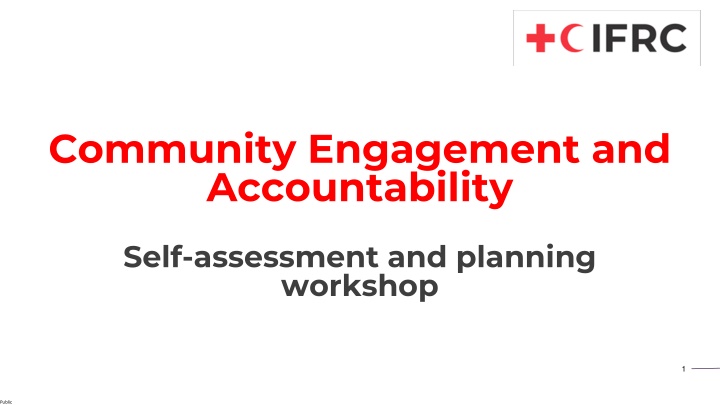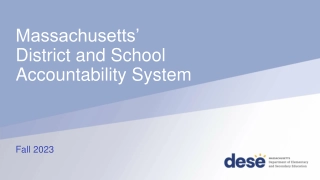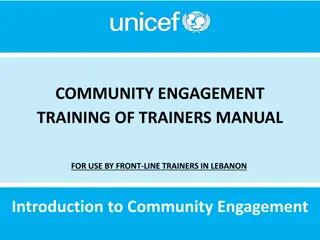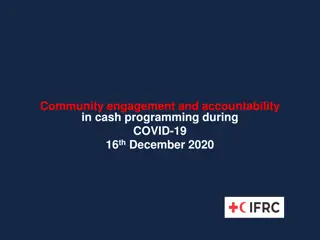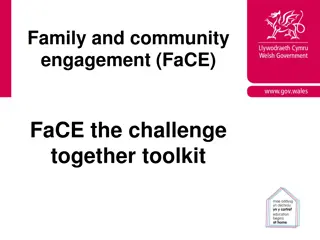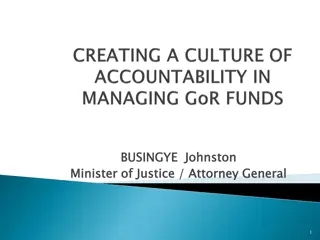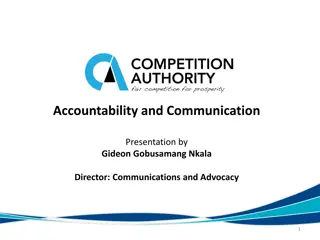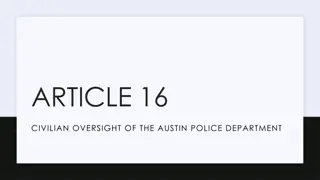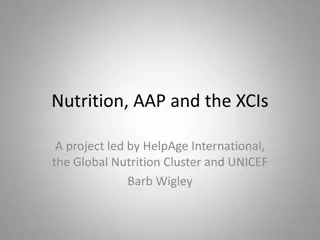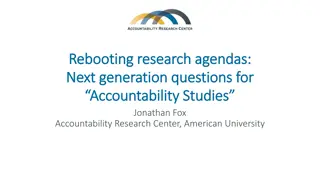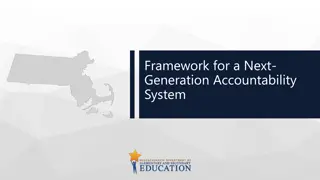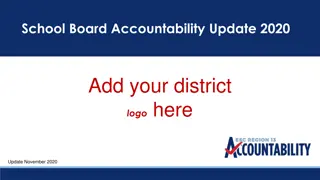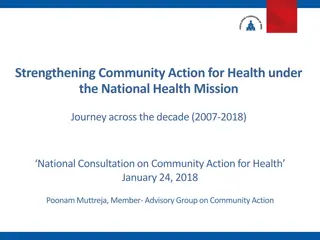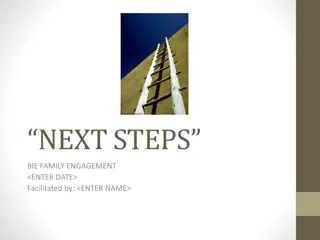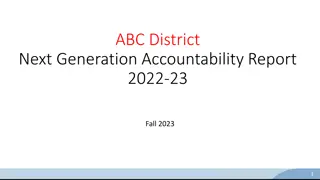Enhancing Community Engagement and Accountability Workshop Overview
This workshop aims to assess the National Society's accountability to communities, identify areas for improvement, and develop action plans for strengthening community engagement. Participants will discuss the importance of engagement, assess current accountability levels, and collaborate on solutions for barriers. The session includes activities like force field analysis and understanding institutionalizing CEA.
Download Presentation

Please find below an Image/Link to download the presentation.
The content on the website is provided AS IS for your information and personal use only. It may not be sold, licensed, or shared on other websites without obtaining consent from the author.If you encounter any issues during the download, it is possible that the publisher has removed the file from their server.
You are allowed to download the files provided on this website for personal or commercial use, subject to the condition that they are used lawfully. All files are the property of their respective owners.
The content on the website is provided AS IS for your information and personal use only. It may not be sold, licensed, or shared on other websites without obtaining consent from the author.
E N D
Presentation Transcript
Community Engagement and Accountability Self-assessment and planning workshop 1 Public
Purpose of this workshop Explore the factors that are supporting the National Society to be accountable to communities and the factors that are holding it back - and how to overcome them Self-assessment to measure how well the National Society and its programmes and operations are meeting the minimum actions for CEA Develop action plans to strengthen CEA institutionally and within programmes and operations including resources, responsibilities and timelines Vote on which activities should be prioritized and included in the National Society s CEA Strategy and work plan 2 Public
What is community engagement & accountability? 3 Public
In pairs discuss (5 mins) Introduce yourself name, role and where you work Why did you want to come to this workshop? Why do you think engagement with communities is important? How accountable is the National Society to communities now? Expectations for this workshop 4 Public
QUESTIONS? 5 Public
Force field analysis exercise 6 Public
What is a force field analysis? Using a force field analysis Strong community engagement and accountability Supporting Preventing At the institutional level Purpose: Understand what is supporting the organisation to be accountable to communities, and what is holding it back at the organisational level - and brainstorm potential solutions to overcome these barriers, including who can lead on each solution and the resources needed 7 Public
8 Public
Developing a shared understanding What do we mean by institutionalizing CEA? What do we mean by factors? Factors are things that can increase or decrease Making it part of the organization s DNA, or business as usual Factors can be either tangible items, such as policies, systems, funding, processes or Integrating CEA in strategies, policies, plans and processes staffing Ensuring it is a predictable, systematic part of every activity, at every stage of the programme cycle or disaster response Or intangibles, such as feelings, attitudes, culture or relationships 9 Public
Force Field Analysis Stage one (50 mins) Preventing strong CEA Enabling strong CEA These are elements or forces that exist now that support the National Society to be accountable to communities in a systematic and reliable way. Factors could be policies, behaviors, structures, processes, and attitudes at the branch or HQ level, or within Movement partners By contrast, these are elements or forces that work against the National Society being accountable to communities. The factors may disrupt processes, hinder good practice, or disincentivize systematic approaches to CEA. These features are often most intuitive to identify. 10 Public
QUESTIONS? 11 Public
Force Field Analysis Groups Group 1 Group 2 Group 3 Group 4 12 Public
Force Field Analysis Stage two (50 mins) Who which positions or teams? What Barriers to strong CEA Causes Effects Solutions resources are needed? No evidence No training Limited understanding of CEA CEA is not well implemented or included in programmes Briefing and training rolled out for all staff CEA Manager Leadership to support, fund and make mandatory Funding for training Training materials A CEA expert/manager 13 Public
Self-assessment exercise 14 Public
Self-assessment exercise (70mins) 1. Strengthen community engagement and accountability understanding and capacity at all levels in the National Society Instructions: YES NO SOMEWHAT 1. Complete the institutionalization checklist by discussing each question in your group and answering yes, no or sometimes or somewhat Is there leadership buy-in and support for CEA? Does the National Society have a CEA policy? Does the National Society have a CEA Strategy or plan? Does the National Society have key performance indicators that measure levels of accountability to communities? Have staff and volunteers been trained on CEA? 2. If you don t know the answer leave it blank 15 Public
Self-assessment exercise (70mins) Instructions: 1. Complete the programmes section by discussing how well your programme or the National Society s programmes in general meet each of the 14 CEA minimum actions 2. Calculate the gap between how well the National Society meets an action now and how well it should be done 3. Decide which CEA minimum actions should be a priority for the National Society and so be included in a CEA strategy or plan. It could be actions with a big gap, or actions that are very important for your National Society 4. Follow the same process for emergency response operations Minimum actions for community engagement and accountability (As per the CEA Guide) 1. How often do you do this action? Always Sometimes Rarely Never 2. How well do you do this action? 5 = excellent 4 = good 3 = ok 2 = needs improving 1 = poor 3. How well would you like to do this action? 5 = excellent 4 = good 3 = ok 2 = needs improving 1 = poor 4. Gap between how well you do it now, and would like to do it Calculate the gap by taking box 2 away from box 3 5. Is this action a priority? Yes No During assessments 1. Search for existing information about the community Sometimes 3 4 1 (e.g., 4 3 = 1) No 16 2. Involve the community in planning the assessment Rarely 2 5 3 (e.g., 5 -2 = 3) Yes Public
Action planning exercise 17 Public
Action planning exercise (90mins) Instructions: 1. Complete the action plan template by listing which CEA minimum actions for institutionalization, programmes and operations you identified as a priority, how, who will do this, resources required and potential challenges 2. Groups do not need to complete all sections if they only focused on one area in the self-assessment 3. Use the findings from the force-field analysis and self-assessment exercises 4. Add more boxes if needed, but be realistic about what can be achieved in the timeframe CEA Action Plan Enablers Priority CEA minimum actions Activities Who Resources Timeline Barriers Solutions / mitigation Outcome 1 Institutionalization: Community engagement and accountability is institutionalized within the National Society s ways of working Other departments not seeing CEA as their responsibility Leadership to help encourage other departments to attend Strengthen CEA capacity and understanding at all levels 1) Deliver the CEA Foundation Training CEA Manager & IFRC, other dept to attend Funding for the training, training materials, staff time to participate By end of Q1 Leadership support for CEA 18 Public
Thank you for attending Final questions? 19 Public
